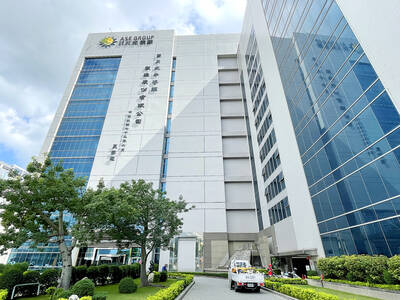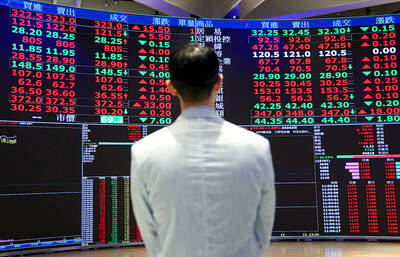Hong Kong has joined London and New York among the world’s top financial centers, with other Asian cities including Shanghai and Seoul also moving up the ranks, a survey said yesterday.
Hong Kong was third behind New York and first-placed London in the Global Financial Centres Index, which ranks 75 financial hubs based on surveys of professionals and criteria including business environment, market access and infrastructure.
“There remains no significant difference between London and New York [in the ratings]. Respondents continue to believe that these centres work together for mutual benefit,” the twice-annual report produced by London-based think tank Z/Yen Group said.
SELECT GROUP
“Hong Kong has joined London and New York as a genuinely global financial centre. Singapore may well join this trio soon,” it said.
Singapore placed fourth in the top 10 and is followed by Tokyo, Shanghai, Chicago, Zurich, Geneva and Sydney.
“The top four centres control a large proportion of financial transactions [over 70 percent of equity trading] ... [and] are likely to remain powerful financial centres for the foreseeable future,” the report said.
Asia “continues to exhibit enhanced competitiveness” with Shanghai breaking into the top 10 and Seoul cracking the top 25, the report said.
TAIPEI
Taipei was ranked 19 in the latest survey, up two places from the No. 21 spot in the previous survey.
NEWCOMERS
Respondents said the five finance centers “likely to become more significant in the next few years” are Shenzhen, Shanghai, Singapore, Seoul and Beijing.
Offshore finance centers such as the Cayman Islands and Malta and debt-laden Dubai had lost ground since the global financial crisis, the report said.
The survey polled 1,876 finance industry professionals.
ADDITIONAL REPORTING BY STAFF WRITER

EXPANSION: The investment came as ASE in July told investors it would accelerate capacity growth to mitigate supply issues, and would boost spending by 16 percent ASE Technology Holding Co (ASE, 日月光投控), the world’s biggest chip assembly and testing service provider, yesterday said it is investing NT$17.6 billion (US$578.6 million) to build a new advanced chip packaging facility in Kaohsiung to cope with fast-growing demand from artificial intelligence (AI), high-performance-computing (HPC) and automotive applications. The new fab, called K18B, is to commence operation in the first quarter of 2028, offering chip-on-wafer-on-substrate (CoWoS) chip packaging and final testing services, ASE said in a statement. The fab is to create 2,000 new jobs upon its completion, ASE said. A wide spectrum of system-level chip packaging technologies would be available at

Taiwan’s foreign exchange reserves hit a record high at the end of last month, surpassing the US$600 billion mark for the first time, the central bank said yesterday. Last month, the country’s foreign exchange reserves rose US$5.51 billion from a month earlier to reach US$602.94 billion due to an increase in returns from the central bank’s portfolio management, the movement of other foreign currencies in the portfolio against the US dollar and the bank’s efforts to smooth the volatility of the New Taiwan dollar. Department of Foreign Exchange Director-General Eugene Tsai (蔡炯民)said a rate cut cycle launched by the US Federal Reserve

HEAVYWEIGHT: The TAIEX ended up 382.67 points, with about 280 of those points contributed by TSMC shares alone, which rose 2.56 percent to close at NT$1,400 Shares in Taiwan broke records at the end of yesterday’s session after contract chipmaker Taiwan Semiconductor Manufacturing Co (TSMC, 台積電) hit a fresh closing-high amid enthusiasm toward artificial intelligence (AI) development, dealers said. The TAIEX ended up 382.67 points, or 1.45 percent, at the day’s high of 26,761.06. Turnover totaled NT$463.09 billion (US$15.22 billion). “The local main board has repeatedly hit new closing highs in the past few sessions as investors continued to embrace high hopes about AI applications, taking cues from a strong showing in shares of US-based AI chip designer Nvidia Corp,” Hua Nan Securities Co (華南永昌證券) analyst Kevin Su

Nvidia Corp’s major server production partner Hon Hai Precision Industry Co (鴻海精密) reported 10.99 percent year-on-year growth in quarterly sales, signaling healthy demand for artificial intelligence (AI) infrastructure. Revenue totaled NT$2.06 trillion (US$67.72 billion) in the last quarter, in line with analysts’ projections, a company statement said. On a quarterly basis, revenue was up 14.47 percent. Hon Hai’s businesses cover four primary product segments: cloud and networking, smart consumer electronics, computing, and components and other products. Last quarter, “cloud and networking products delivered strong growth, components and other products demonstrated significant growth, while smart consumer electronics and computing products slightly declined,” compared with the